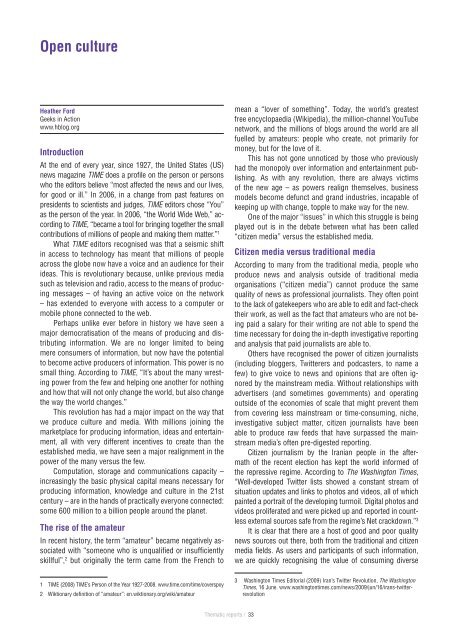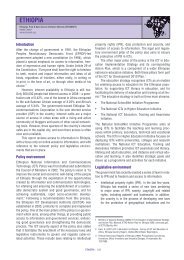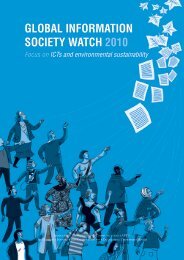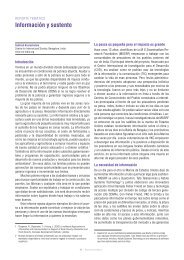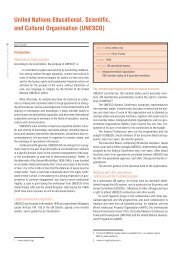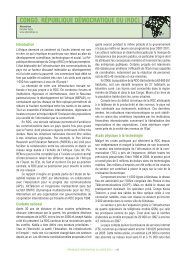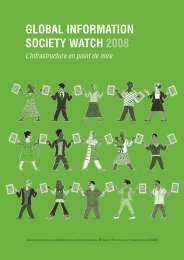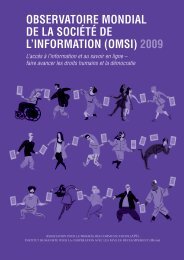Download the full report - Global Information Society Watch
Download the full report - Global Information Society Watch
Download the full report - Global Information Society Watch
Create successful ePaper yourself
Turn your PDF publications into a flip-book with our unique Google optimized e-Paper software.
Open culture<br />
Hea<strong>the</strong>r Ford<br />
Geeks in Action<br />
www.hblog.org<br />
Introduction<br />
At <strong>the</strong> end of every year, since 1927, <strong>the</strong> United States (US)<br />
news magazine TIME does a profile on <strong>the</strong> person or persons<br />
who <strong>the</strong> editors believe “most affected <strong>the</strong> news and our lives,<br />
for good or ill.” In 2006, in a change from past features on<br />
presidents to scientists and judges, TIME editors chose “You”<br />
as <strong>the</strong> person of <strong>the</strong> year. In 2006, “<strong>the</strong> World Wide Web,” according<br />
to TIME, “became a tool for bringing toge<strong>the</strong>r <strong>the</strong> small<br />
contributions of millions of people and making <strong>the</strong>m matter.” 1<br />
What TIME editors recognised was that a seismic shift<br />
in access to technology has meant that millions of people<br />
across <strong>the</strong> globe now have a voice and an audience for <strong>the</strong>ir<br />
ideas. This is revolutionary because, unlike previous media<br />
such as television and radio, access to <strong>the</strong> means of producing<br />
messages – of having an active voice on <strong>the</strong> network<br />
– has extended to everyone with access to a computer or<br />
mobile phone connected to <strong>the</strong> web.<br />
Perhaps unlike ever before in history we have seen a<br />
major democratisation of <strong>the</strong> means of producing and distributing<br />
information. We are no longer limited to being<br />
mere consumers of information, but now have <strong>the</strong> potential<br />
to become active producers of information. This power is no<br />
small thing. According to TIME, “It’s about <strong>the</strong> many wresting<br />
power from <strong>the</strong> few and helping one ano<strong>the</strong>r for nothing<br />
and how that will not only change <strong>the</strong> world, but also change<br />
<strong>the</strong> way <strong>the</strong> world changes.”<br />
This revolution has had a major impact on <strong>the</strong> way that<br />
we produce culture and media. With millions joining <strong>the</strong><br />
marketplace for producing information, ideas and entertainment,<br />
all with very different incentives to create than <strong>the</strong><br />
established media, we have seen a major realignment in <strong>the</strong><br />
power of <strong>the</strong> many versus <strong>the</strong> few.<br />
Computation, storage and communications capacity –<br />
increasingly <strong>the</strong> basic physical capital means necessary for<br />
producing information, knowledge and culture in <strong>the</strong> 21st<br />
century – are in <strong>the</strong> hands of practically everyone connected:<br />
some 600 million to a billion people around <strong>the</strong> planet.<br />
The rise of <strong>the</strong> amateur<br />
In recent history, <strong>the</strong> term “amateur” became negatively associated<br />
with “someone who is unqualified or insufficiently<br />
skillful”, 2 but originally <strong>the</strong> term came from <strong>the</strong> French to<br />
mean a “lover of something”. Today, <strong>the</strong> world’s greatest<br />
free encyclopaedia (Wikipedia), <strong>the</strong> million-channel YouTube<br />
network, and <strong>the</strong> millions of blogs around <strong>the</strong> world are all<br />
fuelled by amateurs: people who create, not primarily for<br />
money, but for <strong>the</strong> love of it.<br />
This has not gone unnoticed by those who previously<br />
had <strong>the</strong> monopoly over information and entertainment publishing.<br />
As with any revolution, <strong>the</strong>re are always victims<br />
of <strong>the</strong> new age – as powers realign <strong>the</strong>mselves, business<br />
models become defunct and grand industries, incapable of<br />
keeping up with change, topple to make way for <strong>the</strong> new.<br />
One of <strong>the</strong> major “issues” in which this struggle is being<br />
played out is in <strong>the</strong> debate between what has been called<br />
“citizen media” versus <strong>the</strong> established media.<br />
Citizen media versus traditional media<br />
According to many from <strong>the</strong> traditional media, people who<br />
produce news and analysis outside of traditional media<br />
organisations (“citizen media”) cannot produce <strong>the</strong> same<br />
quality of news as professional journalists. They often point<br />
to <strong>the</strong> lack of gatekeepers who are able to edit and fact-check<br />
<strong>the</strong>ir work, as well as <strong>the</strong> fact that amateurs who are not being<br />
paid a salary for <strong>the</strong>ir writing are not able to spend <strong>the</strong><br />
time necessary for doing <strong>the</strong> in-depth investigative <strong>report</strong>ing<br />
and analysis that paid journalists are able to.<br />
O<strong>the</strong>rs have recognised <strong>the</strong> power of citizen journalists<br />
(including bloggers, Twitterers and podcasters, to name a<br />
few) to give voice to news and opinions that are often ignored<br />
by <strong>the</strong> mainstream media. Without relationships with<br />
advertisers (and sometimes governments) and operating<br />
outside of <strong>the</strong> economies of scale that might prevent <strong>the</strong>m<br />
from covering less mainstream or time-consuming, niche,<br />
investigative subject matter, citizen journalists have been<br />
able to produce raw feeds that have surpassed <strong>the</strong> mainstream<br />
media’s often pre-digested <strong>report</strong>ing.<br />
Citizen journalism by <strong>the</strong> Iranian people in <strong>the</strong> aftermath<br />
of <strong>the</strong> recent election has kept <strong>the</strong> world informed of<br />
<strong>the</strong> repressive regime. According to The Washington Times,<br />
“Well-developed Twitter lists showed a constant stream of<br />
situation updates and links to photos and videos, all of which<br />
painted a portrait of <strong>the</strong> developing turmoil. Digital photos and<br />
videos proliferated and were picked up and <strong>report</strong>ed in countless<br />
external sources safe from <strong>the</strong> regime’s Net crackdown.” 3<br />
It is clear that <strong>the</strong>re are a host of good and poor quality<br />
news sources out <strong>the</strong>re, both from <strong>the</strong> traditional and citizen<br />
media fields. As users and participants of such information,<br />
we are quickly recognising <strong>the</strong> value of consuming diverse<br />
1 TIME (2008) TIME’s Person of <strong>the</strong> Year 1927-2008. www.time.com/time/coverspoy<br />
2 Wiktionary definition of “amateur”: en.wiktionary.org/wiki/amateur<br />
3 Washington Times Editorial (2009) Iran’s Twitter Revolution, The Washington<br />
Times, 16 June. www.washingtontimes.com/news/2009/jun/16/irans-twitterrevolution<br />
Thematic <strong>report</strong>s / 33


